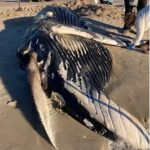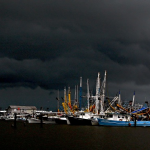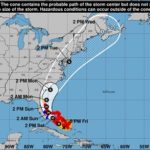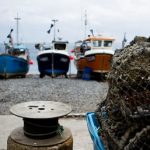Decline of Gulf of Maine cod leaves regulators a tough task
 The Gulf of Maine cod population has continued to drop despite decades of catch restrictions, according to preliminary results of a new National Oceanic and Atmospheric Administration study. Exact causes are unknown, but they likely include warming of the oceans and continued overfishing, marine scientists said. <Read more here> 08:11
The Gulf of Maine cod population has continued to drop despite decades of catch restrictions, according to preliminary results of a new National Oceanic and Atmospheric Administration study. Exact causes are unknown, but they likely include warming of the oceans and continued overfishing, marine scientists said. <Read more here> 08:11











































Anyone that believes these fish will remain in temperature conditions that they find unsuitable, is a buffoon. The notion is absurd, and that has driven these fish out of the Gulf of Maine, being replaced by fish not prevalent in this area until now. Think about it!
Summer Flounder shifting Northward. Black Sea Bass shifting Northward. Mahi Mahi shifting Northward. Scientists and regulators incapable of understanding the shift of fish populations, word wide, towards the Poles? There have been more articles about studies that claim this has been happening for four decades. Forget about the cod that fishery management of four decades that for various reasons has set up this fish to fail! Through mismanagement, the natural predators of these fish from dogfish, and seals, herring that get two swipes at devouring them in the larval stage and the codling stage are totally disregarded in all of this. Forget about coastal water degradation of decades that affect juvenile fish that we are all culpable in, and still, continuously and arrogantly, over fishing is the only thing that gets pointed to. I smell a rat in this un expected and un scheduled survey.
Notice of Agency Rule Making for Gulf of Maine Black Sea Bass! Ain’t that something! http://www.maine.gov/dmr/51blackseabassproposedweb.pdf
We can bring the Atlantic Cod back as we have the Pacific salmon. Ocean pasture restoration is what has returned Pacific salmon to historic levels of abundance. The same caring for the ocean pastures of the Atlantic Cod will bring them back, very quickly, and inexpensively. http://russgeorge.net/2014/08/10/atlantic-cod-declining-even/
Stock shifting in the Mid-Atlantic has been going on since the early 90’s, and as we saw our offshore wrecks even as far south as southern New Jersey slowing giving up fewer cod and pollock as they were replaced by black sea bass and scup, and now the last few winters, overwhelmingly by BSB. Fluke too has shown noticeably signs of stock shifting with bigger fish moving northward and eastward.
Also cooler water fish such as whiting and mackerel have also become much less prevalent in this region at the same time, again lending credence to northward stock shifting of traditional species that would come inshore in the late fall, early winter and spring period…..but surprisingly we still have codfish here, in numbers that have been better in the past over the last few years in the NY-NJ BIGHT, with 30lb fish normally caught and a 40lb cod not being as rare as they were a couple of years back when targeted by rod and reel fishermen.
Ask anyone in the GOM when was the last time they could count on catching a cod that large, and they would point out pre the implementation of Catch Shares in New England.
Nonetheless, the issue at hand is that the cod fishery in the GOM is and has essentially been in a death spiral with
even with noticeably reduced fishing effort by both the commercial and recreational sectors, the stock continues to quickly contract. So the question comes down to “what regulatory actions have to be taken to stop the slide since the SSB is at a rock bottom 3-4%?”
No one wants to hear the answer, and even if if is stock displacement of warm water species such as fluke and BSB are becoming more common, they tend to be found and are targeted inshore in shallower waters, especially when you come into the GOM.
This does not explain why there are so few codfish out at Cashes, Fipps, Parker and Sharrer Ridge? How come the fingers on Jefferies are not as productive?
If it is a change in the eco-system, then what steps have to be immediately taken to reverse the slide….one that definitely seems to be caused by changing water temperatures?